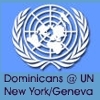

| BRIEFING - July 2, 2014 | To learn more about the Millenium Development Goals, click on the graphic Read the summer 2014 “Dominicans at the UN” newsletter Past Briefings: June 18, 2014 June 4, 2014 May 7, 2014 April 9, 2014 March 19, 2014 March 5, 2014 Feb 19, 2014 Jan 8, 2014 Nov 22, 2013 Oct 23, 2013 Oct 9, 2013 Sept 25, 2013 Sept 11, 2013 July 10, 2013 June 26, 2013 June 12, 2013 May 8, 2013 April 24, 2013 |
|
Access to clean, potable water is a human right “The City of Detroit is facing a major water crisis as a result of decades of policies that have put corporate business and profit ahead of the public good and human rights. Social programs and investments in essential infrastructure have been slashed. According to the Detroit News, the City of Detroit’s water department runs a chronic deficit, and, like many other public water infrastructure systems, needs more than $5 billion for urgently needed upgrades to the city’s water system. With globalization and the hollowing out of the once-mighty auto industry, wealth and businesses fled to the suburbs, draining the city of its tax base and the water department of its revenues. “The case of water cut-offs in the City of Detroit speaks to the deep racial divides and intractable economic and social inequality in access to services within the United States. The burden of paying for city services has fallen onto the residents who have stayed within the economically depressed city, most of whom are African-American. These residents have seen water rates rise by 119 percent within the last decade. With official, understated unemployment rates at a record high and the official, understated poverty rate at about 40 per cent, Detroit water bills are unaffordable to a significant portion of the population.” Believe it or not, the above is an excerpt from a submission made on June 18 to the UN Special Rapporteur on the Human Right to Safe Drinking Water and Sanitation. This situation right here in our midst highlights what millions of people throughout the world contend with each and every day. Here are just a few of the facts (sources: www.water.org and www.unwater.org):
In the ongoing discussions regarding the Sustainable Development Goals (SDGs), there has been a move to marginalize the human right to water and sanitation, and to focus on “access,” rather than rights. This “access,” however, is in competition with industries in constant search for secure water sources to sustain and expand business operations in the relentless pursuit of economic growth. The latest trend in global and national water policy is for corporations to participate in decision-making bodies, where they promote corporate-driven solutions through public-private partnerships. However, in these arrangements the needs and the rights of people, and the care of Earth and her ecosystems are seldom the priority. The SDG process draws to a conclusion on July 18. So between now and then, civil society will be doing its part to advocate for the incorporation of the human rights to clean water and sanitation into the final text. Here is a simple way in which you can help with the unjust situation in Detroit. A letter sent to the members of the Open Working Group on Sustainable Development Goals, endorsed by 300 civil society organizations, including the Dominican Leadership Conference/Dominican Sisters International, addresses the “urgent need to protect and promote the human right to water and sanitation.” (Link to PDF document) Send this letter to H.E. Samantha Power at USUNPolFax@state.gov. And please also join us in sending a message to President Obama (www.whitehouse.gov/contact and Michigan Governor Rick Snyder (www.michigan.gov/snyder) to uphold the human right to water and to stop the water cut-offs. Thanks and farewell to Dominican Volunteer On another note, I would like to express my gratitude to Abby McCrary, my Dominican Volunteer, who leaves the position on July 11. Abby has been an invaluable help to me this past year. She has been the Dominican presence at the NGO Committee on the Status of Women, the Working Group on Girls and the NGO Committee to Stop Trafficking in Persons, and has represented us very well! She has contributed Briefings to Domlife on a regular basis, and has done a wonderful job on the newsletters as well. Her quiet, gentle, competent presence will be missed—by me, and by my colleagues as well. Thank you, Abby, and God’s blessings to you and to Duncan as you begin your life together!
|
Dominican Leadership Conference
Building relationships and collaborating in the mission of preaching the Gospel
29000 West Eleven Mile Road
Farmington Hills MI 48336
248-536-3234 Contact: Executive Director

